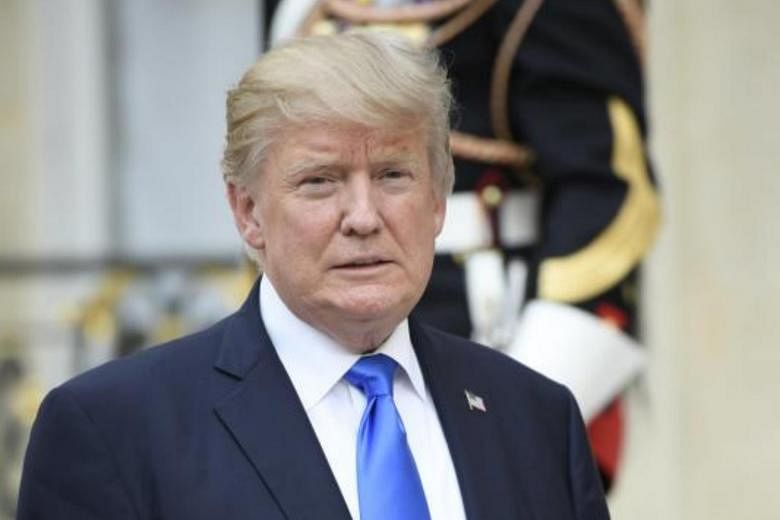Trump versus Kim Jong-Un
Editorial
The Jakarta Post, Indonesia
As both United States President Donald Trump and North Korean leader Kim Jong-un are unpredictable and impulsive, it is not impossible to expect that the prolonged crisis on the Korean Peninsula will trigger a military conflict.
The United Nations Security Council has produced dozens of resolutions, including imposing trade and economic sanctions.But the international community cannot just watch from the sidelines, because the opposing camps could take any action against universal norms.
Trump and Kim have exchanged harsh threats, and the confrontation is becoming personal to both. We need to remember that both less significant and major wars, including World War I and II, were often triggered by the ego of leaders.
The North wants to negotiate directly with Washington and not with others. It belittled the role of Japan and South Korea, neighbours heavily guarded by the US military. Newly elected South Korean President Moon Jae-in offered a stick and carrot approach, but it will likely fail, as it did with his predecessors and also Japan.
Pyongyang has even ignored China, its only ally and major economic donor. China may still be confident the crisis on the Korean Peninsula will never spiral out of control.
But Trump indicated that he had lost patience with Pyongyang.
Trump and Kim are desperate for recognition of their leadership in their own nations.
The North's nuclear threat is moving closer to reality, and Kim has repeatedly threatened to launch devastating nuclear attacks against any hostile country, including South Korea, Japan and the US. His nuclear project is probably not as advanced as he boasts, but knowing that the only way to retain his power is by obtaining the deadly weapon, it seems just a matter of time before the North joins the club of nuclear states.
North Korea drives a wedge between US, China
Editorial
The Nation, Thailand
If the current strategy pursued by North Korea works, the world's great powers will find themselves at loggerheads with one another. On one side would be China and Russia. On the other side would be a coalition led by the United States including Japan, South Korea and the European Union. These two massive blocs would be confronting one another over the nuclear ambitions of a single rogue nation.
There is no clear solution to the North Korea dilemma and none evident in the foreseeable future. The North's paranoid leader, Kim Jong-un, has perfected the art of international blackmail, having learned from his father and grandfather that the major powers will always follow their own individual interests and refuse to collaborate unless doing so meets those interests.
There had been some hope earlier that the Association of Southeast Asian Nations might be of assistance in reducing global tensions over North Korea's nuclear ambitions defiant pursuit of globe-circling rockets and a nuclear arsenal. Pyongyang had even requested its help. But somewhere along the way, Kim has decided to stop paying attention to any regional efforts to foment peace. His focus is now entirely on the major powers.
Despite chronic malnutrition among its populace due to poor agricultural output, North Korea's keenest hope is that the world, especially the US, will recognise it as a member of the nuclear-armed guild of nations.
This wish simply cannot be granted. Pyongyang has spent years improving its nuclear capacity and lengthening the reach of its ballistic missiles, drawing a bead on the US in the hope of forcing Washington to yield to its objective. Seventy years after the war on the peninsula ended without a formal peace treaty being signed, the North is still technically at war with the South and the US.
It has now become incumbent on the US and China to stop North Korea. It will take time, but what is most important is that they act in unison. Pyongyang must not be allowed to continue testing ballistic missiles as it has for the past nine years.
Conciliatory policy by China-Russia not okay
Editorial
The Yomiuri Shimbun, Japan
With North Korea's launch of an intercontinental ballistic missile, it has become more necessary for the international community to strengthen pressure on the country. If China and Russia continue to resist additional sanctions against Pyongyang, it will further aggravate the situation.
At a summit of the Group of 20 major and emerging economies in Germany, U.S. President Donald Trump held separate meetings with Chinese President Xi Jinping and Russian President Vladimir Putin.
Xi emphasised "efforts to promote talks" with North Korea and did not change his passive attitude .
In their foreign ministers' joint statement, China and Russia insisted that North Korea's "justified concerns should be respected" and proposed freezing, at the same time, North Korea's nuclear and missile development programs and joint military exercises by the United States and South Korea.
Taking into account how Pyongyang has scrapped various agreements, the proposal by China and Russia is difficult to accept.
What is worrisome is that U.S. isolation was prominent at the G-20 summit. With the U.S. announcement to withdraw from the Paris Agreement for measures against global warming in mind, the G-20 leaders' declaration came out with a policy to promote the climate accord within the remaining 19 countries and regions.It is clear that Trump's "America first" foreign policy has created a crack in the G-20 unity.
Trump must be aware that if the United States' international isolation becomes deeper, it could have a smaller voice and its influence on the North Korea issue may be restricted.
The View From Asia is a compilation of articles from The Straits Times' media partner, Asia News Network, a grouping of 22 news media entities.

